
3 minute read
SHOULD WE START SCREENING FOR COLON CANCER AT AGE 45?
BY DR. PETER UBEL MADGE AND DENNIS T. MCLAWHORN UNIVERSITY PROFESSOR OF BUSINESS, PUBLIC POLICY, AND MEDICINE AT DUKE UNIVERSITY
Here’s what most medical experts agree on: People 50 and older should be screened for colon cancer.
Here’s what is more controversial: Whether that screening should start, routinely, at age 45.
Recently, the American Cancer Society (ACS) recommended that colon cancer screenings start at age 45. Their recommendation was based in large part on an uptick in the number of people 45 to 50 years old who are being diagnosed with colon cancer in the last couple of decades, a 22% increase.
But the ACS recommendation might be recommending more cancer screening than the American public needs. In an op-ed in the Annals of Internal Medicine, three physicians raise important concerns about this new screening recommendation.
Why in heaven’s name would anyone raise questions about screening 45 year olds, in the face of this steep increase in cancer diagnoses? It boils down to three issues:
1. EXAGGERATED RISK.
While the 22% increase in cancer diagnoses is factually correct, it is also a relative risk increase, which makes the risk feel bigger than it really is. In actuality, the rate of cancer diagnoses in 45 to 50 year olds has risen from 5.9 to 7.2 people out of 100,000, an absolute increase of only 1.3%.
2. UNPROVEN BENEFITS.
No randomized trials have proven that starting screening at age 45 saves lives. Instead, the ACS bases its recommendation on a computer model that predicts (but doesn’t establish) such benefit.
3. LEAD TIME BIAS.
If more people are being diagnosed with colon cancer at earlier ages, then you’d expect to see more people dying of cancer at those ages, too. But instead, death rates haven’t changed one bit. That stable death rate suggests that the increase in cancer diagnoses simply means we’re finding cancers that we would have found in time at a later point, even if we’d waited until age 50 to start screening. Here is a picture of this potential lead time bias, showing a line on top rising with that 1.3% increase in cancer diagnoses, and a flat line on the bottom showing no such change in cancer deaths:
Colorectal cancer incidence and mortality rates per 1,000 person-years and percentage of patients screened, What’s the bottom line, so to speak?
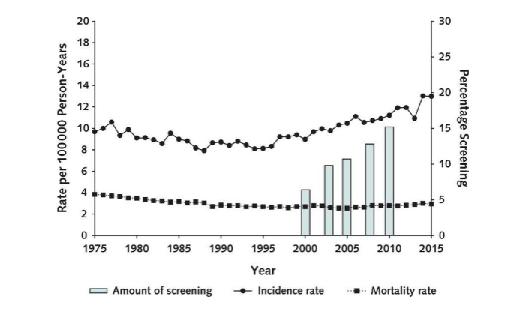
1. If you’re 50 or older, you should get screened for colon cancer.
2. If you have an elevated risk of colon cancer – from family history, for example – ask your doctor if you should get screened before age 50. (You probably should.)
3. If you’re at normal risk and wonder about getting screened at age 45, remember that starting at this age is unproven. We don’t really know, yet, whether screening tests will do you more good than harm.
Peter A. Ubel M.D. is the Madge and Dennis T. McLawhorn University Professor of Business, Public Policy and Medicine at Duke University. A physician and a behavioral scientist, he uses the tools of decision psychology and behavioral economics to explore topics like informed consent, shared decision making and health care cost containment. He has authored over 250 academic publications, the majority of which involve empirical explorations of decision psychology as it pertains to health care. He has written for the New York Times, the Los Angeles Times, the Atlantic, the New Yorker, and is a regular contributor at Forbes. His books include Pricing Life (MIT Press 2000), Free Market Madness (Harvard Business Press, 2009) and Critical Decisions (HarperCollins, 2012). His newest book, Sick to Debt, is scheduled for release in 2019 (Yale University Press). You can find his blogs and other information at http://www.peterubel.com/.
2541
OSOM® BVBLUE®
From Sekisui Diagnostics
The OSOM® BVBLUE® detects elevated vaginal fluid sialidase activity, an enzyme produced by bacterial pathogens associated with bacterial vaginosis including Gardnerella, Bacteroides, Prevotella and Mobiluncus. OSOM®
BVBLUE® is more sensitive than Amsel criteria providing physicians with a more accurate diagnosis to treat and minimize serious health consequences such as early spontaneous preterm births and miscarriage.
View Brochures, Videos & More at POR.io
Enter Number 2541 in the Search Area
OSOM® TRICHOMONAS RAPID TEST
From Sekisui Diagnostics
The OSOM® Trichomonas Rapid Test is intended for the qualitative detection of Trichomonas vaginalis antigens from vaginal swabs or from the saline solution. The OSOM® Trichomonas Rapid Test is a CLIA-waived rapid test available today. OSOM® Trichomonas is more sensitive than wet mount due to the assay being able to detect viable and non-viable organisms which offers significant benefits to the patient and clinician alike.
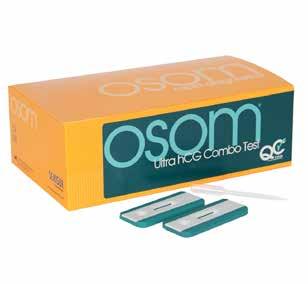
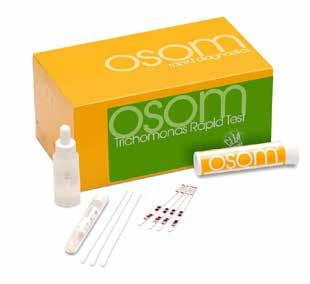
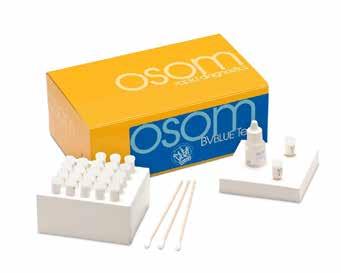
View Brochures, Videos & More at POR.io
Enter Number 2542 in the Search Area
Ultra Hcg Combo Test
2542
2543
From Sekisui Diagnostics
The OSOM® Ultra hCG Combo test is a simple immunoassay for the qualitative detection of human chorionic gonadotropin (hCG) in serum or urine for the early confirmation of pregnancy. Internal studies have confirmed that the OSOM® Ultra hCG Combo test does not have a false negative result from hCG variants providing physicians with a higher level of confidence.
View Brochures, Videos & More at POR.io
Enter Number 2543 in the Search Area
Comprehensive toxicology menu now with 14 CLIA 1 categorized moderate complexity assays.
BENCHTOP ANALYZER
Toxicology screening solutions for physician offices, pain management, treatment centers and laboratories testing 200+ patient samples/mo.
MODERATE COMPLEXITY ASSAYS – FDA 510(K) CLEARED
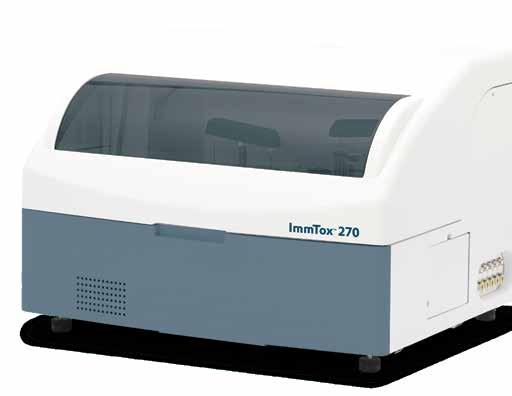
6-acetylmorphine (6-AM Heroin metabolite)
Amphetamine
Barbiturates
Benzodiazepines
Benzoylecgonine (Cocaine metabolite)
Buprenorphine
Cannabinoids (THC)
270
EDDP (Methadone metabolite)
Fentanyl*
Methamphetamine
Opiates
Oxycodone
Phencyclidine (PCP)
Tramadol









